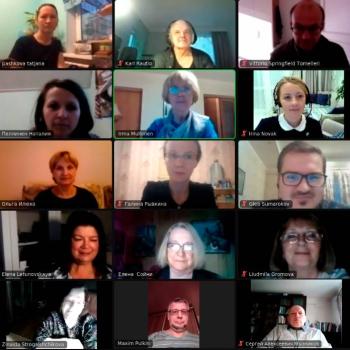By Heidi Gehman
One day in August, four and a half years ago, Beth Kerrigan and Jody Mock walked into Madison, Connecticut's town hall and asked for a marriage license. They were refused. The two women, along with seven other couples, proceeded to file a lawsuit that led to the Supreme Court ruling on October 10, 2008 granting same-sex couples the right to marry.
As the state legislature began plans for the implementation of the ruling in a marriage codification bill, groups gathered to lobby on both sides of the issue. Love Makes a Family, a coalition of organizations and individuals working for marriage equality for same-sex couples, sought to prevent amendments or provisions that would limit marriage equality in any way. Other groups, such as the Roman Catholic Church and the Knights of Columbus, fought for provisions exempting religious organizations and businesses from the requirements of the law. In the end, a middle way was taken with the passage of a provision exempting only religious organizations who oppose same-sex marriage.
Where does this leave local churches and synagogues? Those churches and synagogues that already offer support to same-sex relationships will now be able to perform marriage ceremonies for those couples. On the flip side, religious leaders who do not wish to offer that service will not be required to do so. Some denominations, like the United Church of Christ and the Unitarian Universalists, leave the decision whether or not to marry a same-sex couple up to their ministers.
"This is a remarkable day," said the Rev. Edward Horstmann, senior pastor at Immanuel Congregational Church, United Church of Christ, in Hartford, CT. Rev. Horstmann was approached in November, soon after the Supreme Court ruling, by a couple from Arizona who had intended to marry in California before voters there overturned that state's equal marriage ruling. The couple had found out about Immanuel Congregational Church through Love Makes a Family, and were married by Rev. Horstmann, who gave them the "blessing of Christ's church."
Some pastors in other denominations, such as Episcopalian, Methodist, Presbyterian, and Evangelical Lutheran, whose official policies state that clergy may not marry same-sex couples, have found creative ways to hold wedding ceremonies in their churches by involving a justice-of-the-peace to officiate, while offering their own blessing of the couple. This was already being done in churches under Connecticut's civil union statute.
Others are choosing to defy their denomination's official position. Now that marrying gay couples is legal, some pastors feel called to take a stand on the issue -- or at least quietly go ahead with such marriages. "Within 60 days, I found out I was being investigated" for performing a same-sex wedding, says one local protestant minister, whose denomination doesn't allow for same-sex marriages. He had quietly married a gay couple in their home soon after the court decision and thought nothing would come of it. Although the local leadership of his denomination has indicated that they hope to "create space so that we can be in ministry together," the outcome of the investigation is uncertain, and he could be stripped of his ordination.
Religious leaders who do not support same-sex marriage are unlikely to be approached to perform a wedding ceremony, and if they are, will be free under the law to refuse to do so. As such, many church leaders have indicated that the new law has had no effect on their ministry or their congregational life.
Has much has changed for congregations in Connecticut now that same-sex marriage is legal? It would seem that for those who do not support same-sex marriage, the answer is no. But for those pastors and denominations who have been supportive of this cause, either actively or quietly, it is a new day, where love can be celebrated in a community of faith, blessed by the church, and made legal by the state. And it may be that making same-sex marriage legal will lead to stronger advocacy for marriage equality in those denominations who do not allow their clergy to marry same-sex couples. Like the Protestant minister who is now being investigated, the very fact that same-sex marriage is now legal may compel actions and conversations that result in shifts in official church positions. In this sense, those who oppose same-sex marriage are right to worry that the legalization of same-sex marriage will change things even for denominations, if not for individual clergy, who don't support it.
1/1/2000 5:00:00 AM




